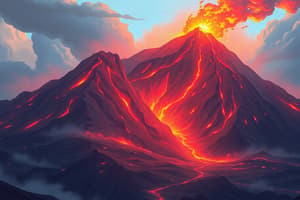Podcast
Questions and Answers
Which gas is NOT commonly released during volcanic eruptions?
Which gas is NOT commonly released during volcanic eruptions?
- Nitric acid (correct)
- Carbon dioxide
- Sulfur dioxide
- Carbon monoxide
Volcanic activity can lead to the formation of new landforms such as calderas and volcanic islands.
Volcanic activity can lead to the formation of new landforms such as calderas and volcanic islands.
True (A)
Name one impact of volcanic eruptions on aquatic ecosystems.
Name one impact of volcanic eruptions on aquatic ecosystems.
Impact on water quality due to the release of gases and ash.
Volcanic eruptions contribute to the formation of acid rain through the release of ________.
Volcanic eruptions contribute to the formation of acid rain through the release of ________.
Match the chemical compounds with their corresponding effects:
Match the chemical compounds with their corresponding effects:
Flashcards are hidden until you start studying
Study Notes
Impacts of Volcanic Activity
- Gas Emissions: Volcanic eruptions emit gases like sulfur dioxide (SO2) and carbon dioxide (CO2), contributing to acid rain and influencing climate changes.
- Air Quality and Climate: Eruptions can deteriorate air quality and have significant effects on both short-term and long-term climate patterns.
- Aquatic Ecosystems: Volcanic activity can alter aquatic environments, impacting lakes and oceans, including changes to hydrothermal vent systems.
- Landform Creation: New landforms such as mountains, calderas, volcanic islands, and geological hotspots are formed as a result of volcanic eruptions.
- Soil Formation: Volcanic activity plays a role in creating fertile soil, which can affect ecosystem dynamics, including plant and animal life diversity.
Chemical Compounds Released
- Key Compounds: Major volcanic gases include CO2 (carbon dioxide), SO2 (sulfur dioxide), HNO3 (nitric acid), H2SO4 (sulfuric acid), CO (carbon monoxide), and H2O (water).
- Acid Formation: Gases like SO2 and HNO3 contribute to the formation of acid rain, which can harm ecosystems and alter environmental conditions.
Studying That Suits You
Use AI to generate personalized quizzes and flashcards to suit your learning preferences.




